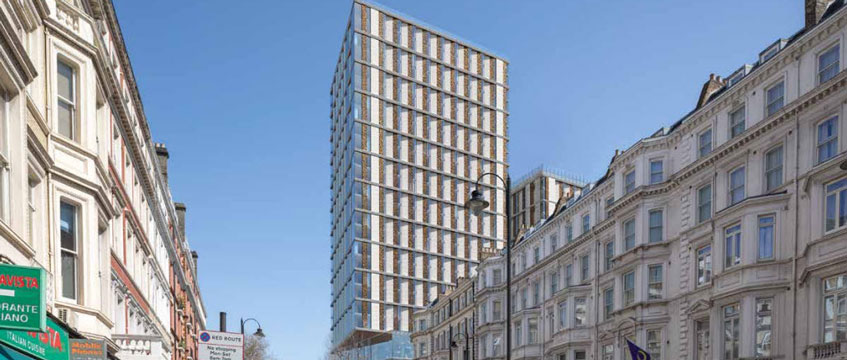GLA approves controversial redevelopment of Kensington Forum Hotel
Deputy London mayor Jules Pipe has approved Queensgate’s controversial plans for the Kensington Forum Hotel, SW7.
Pipe said he agreed with the Greater London Authority’s planning officers that the scheme offered “much improved public space” and that it was of a “high enough quality” to approve. At a public hearing, he added that the public benefits outweighed any harm to surrounding heritage assets.
Pipe’s decision comes despite the scheme receiving hundreds of objections, including 354 during the latest public consultation between August and September, and continued opposition from the Royal Borough of Kensington & Chelsea.
Deputy London mayor Jules Pipe has approved Queensgate’s controversial plans for the Kensington Forum Hotel, SW7.
Pipe said he agreed with the Greater London Authority’s planning officers that the scheme offered “much improved public space” and that it was of a “high enough quality” to approve. At a public hearing, he added that the public benefits outweighed any harm to surrounding heritage assets.
Pipe’s decision comes despite the scheme receiving hundreds of objections, including 354 during the latest public consultation between August and September, and continued opposition from the Royal Borough of Kensington & Chelsea.
The plans, designed by SimpsonHaugh for investor Queensgate and developer Rockwell Property, will deliver 749 hotel bedrooms, 340 serviced apartments and 62 affordable homes across a stepped building comprising three elements, including two towers.
It is the second time the GLA has ruled on the planning application after RBKC successfully quashed mayor Sadiq Khan’s approval of the plans following its own refusal in 2018. The plans have not been altered since June 2019, when the affordable housing within the scheme was increased from 46 to 62 units.
During the public hearing, Rockwell Property’s director and head of planning and development Jonathan Manns said the company already had three formal written reconfirmations of interest from IHG, Accor and Hilton.
He quoted an e-mail from Jon Colley, head of development for UK and Ireland at IHG, which said: “We believe the redevelopment would work well for an upper-scale or luxury hotel”, reinforcing the repositioning of the site as an improvement on the existing hotel.
He added that Notting Hill Genesis, Network Homes, Octavia Housing and the Guinness Partnership were all interested in running the affordable housing element of the scheme.
Objectors argued that the increase in height and the increased number of towers would cause severe harm to the surrounding conservation areas and multiple heritage assets. The suitability of a rooftop playground was also questioned.
One objector, Philip Gumuchdjian of Gumuchdjian Architects, described the use of stone and bronze to clad the building as akin to putting “lipstick on a gorilla”.
Martin Lomas, strategic development team leader at RBKC, said approving a large hotel scheme on the grounds of 9% of space being given to affordable housing was not justifiable and called it “erroneous” to suggest that this was a credible mixed-use development.
However, Ian Simpson, co-founder of SimpsonHaugh & Partners, argued that his designs were “elegant and a beautiful solution for the site” and that the proposals included only a 30% increase in the size of the superstructure. He added that the increase in size was necessary to make the hotel rooms of a size fit for purpose.
A revamp of the existing Richard Seifert-designed building was impossible due to the way it had been “constructed like an egg crate,” Simpson said.
To send feedback, e-mail louise.dransfield@egi.co.uk or tweet @DransfieldL or @estatesgazette











